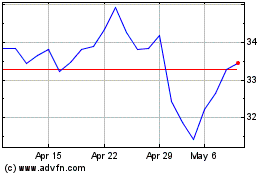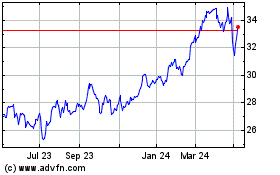HSBC Defends Itself to Shareholders
April 22 2016 - 12:20PM
Dow Jones News
LONDON—HSBC Holdings PLC faced questioning from shareholders
Friday about its sunken share price and the effects of Asia's
slowdown, but avoided a revolt running through other U.K. companies
over executive pay.
Shareholders threw their support behind the bank's board despite
calls to vote against the bank's pay policy and the re-election of
Chairman Douglas Flint. HSBC's pay policy, which was rejiggered
this year to lower the maximum pay executives can receive, was
approved by 96% of voting shareholders.
Shareholder votes on pay are one of the main ways for investors
in the U.K. to express discontent, and several other companies,
including BP PLC and Anglo American, registered large votes against
their policies this month.
The main worries for shareholders Friday were around the 23%
decline in HSBC's stock price from a year ago, and the bank's
ability to keep paying big dividends.
There was also concern around Britain potentially leaving the
European Union, which HSBC Chairman Douglas Flint said would be bad
for U.K. customers and cause a "period of great uncertainty."
Once a sprawling bank across 87 countries, HSBC has exited
swaths of the globe to improve profits and cope with tougher
regulations since the financial crisis. Its main regions now are
Asia, the U.K. and North America. In February, HSBC decided to stay
headquartered in London after considering a return to its original
Hong Kong base.
The bank has been hit this year by soured sentiment toward
commodities and emerging markets, two key planks of its business.
Plans to double down on Asia by pushing into China's domestic
retail and financial markets may pay off in the long term but is
seen as a short-term drag on earnings.
Chief Executive Stuart Gulliver said the share price "isn't
where we want it to be," and that a weak global economy is weighing
on trade and investment.
He said Asia will continue to drive future growth for the bank,
particularly the Pearl River Delta area of China that he is staking
his legacy on. Investors so far have had a lukewarm response to the
plan, even after a trip last week with bank officials to the
region.
Concerns around the strategy include uncertainty about China's
pace in opening its financial markets, and the ability of foreign
banks to compete for lending and deposits against big state-owned
banks.
"HSBC is better balanced, better connected and better placed to
capitalize on higher-return businesses than it was 12 months ago,"
Mr. Gulliver said. However, he warned that keeping costs down and
revenue up are big challenges for the bank this year because of
weak economic conditions.
Both Mr. Gulliver and Mr. Flint received strong approvals from
shareholders on their re-elections to the board, even as the bank
lays the groundwork for their departures. Mr. Flint is to leave
next year once a successor is named, and Mr. Gulliver's replacement
will then be sought by the new chairman.
A new board member, French insurance executive Henri de
Castries, is tipped as the likely next chairman, but it is far from
clear who the next CEO will be and what it will mean for a bank
whose center of gravity is split between Europe and Asia.
Mr. de Castries told reporters "I'm not saying anything" when
asked if he might take the chairman role. He joined the HSBC board
in March and is set to step down from his current role as chairman
and CEO of insurer AXA in September.
Write to Margot Patrick at margot.patrick@wsj.com
(END) Dow Jones Newswires
April 22, 2016 12:05 ET (16:05 GMT)
Copyright (c) 2016 Dow Jones & Company, Inc.
Axa (EU:CS)
Historical Stock Chart
From Mar 2024 to Apr 2024

Axa (EU:CS)
Historical Stock Chart
From Apr 2023 to Apr 2024
